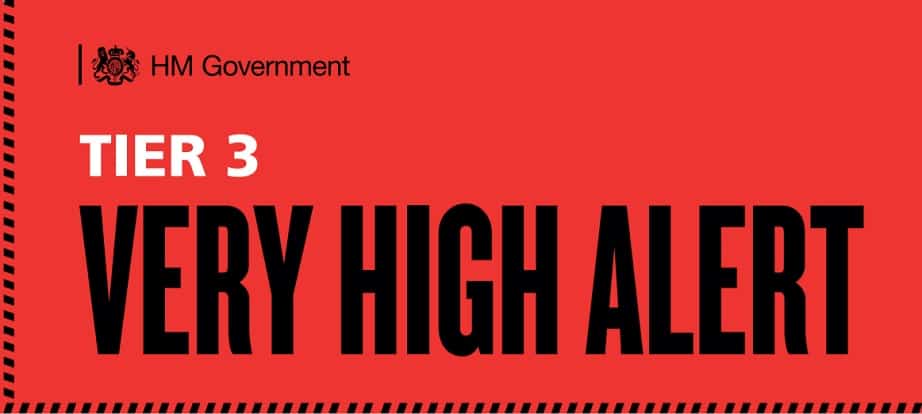
Tier 3 it is then for Kent and Medway when national lockdown ends on December 2.
Government says the strictest measures are in place for the county because: “”Some of the highest case rates in the country are currently seen in Kent. Rising case rates in people aged over 60 are a particular concern. Positivity is also increasing in 10 of the 13 lower tier local authorities.
“Kent And Medway STP are reporting hospital admissions are increasing and mutual aid necessary across the county.”
The measures mean pubs, restaurants, hotels and indoor leisure such as cinemas and theatres once again bear the brunt of restrictions.
What is open?
All essential and non-essential retail, including indoor and outdoor markets and car boot sales
Certain leisure and sporting facilities such as gyms, sports courts and facilities, leisure centres, fitness and dance studios, golf courses, swimming pools, riding centres, outdoor playgrounds – subject to relevant social contact rules in each tier.
Personal care and close contact services such as hairdressers and barbers, beauty salons, tattoo parlours, nail salons, spas and beauty services, massage parlours and tanning salons
Public buildings, such as libraries, community centres and halls. They should not host events for private hire, such as birthday parties or most other social activities in tier 3
Allotments, recycling and waste centres, public toilets, car parks
Essential public services such as the NHS and medical services, courts, and jobcentre plus sites
Places of worship – communal worship can resume, subject to relevant social contact rules in each tier
Education – all settings open
Tier 3 – what’s not open
Hospitality settings, such as bars (including shisha venues), pubs, cafes and restaurants are closed – they are permitted to continue sales by takeaway, click-and-collect, drive-through or delivery services.
Accommodation such as hotels, B&Bs, campsites, and guest houses must close. There are several exemptions, such as for those who use these venues as their main residence, and those requiring the venues where it is reasonably necessary for work or education and training
Indoor entertainment and tourist venues must close. This includes:
indoor play centres and areas, including trampolining parks and soft play
casinos
bingo halls
bowling alleys
skating rinks
amusement arcades and adult gaming centres
laser quests and escape rooms
cinemas, theatres and concert halls
snooker halls
indoor attractions at mostly outdoor entertainment venues must also close (indoor shops, through-ways and public toilets at such attractions can remain open).
Saunas and steam rooms should close
Organised indoor sport, physical activity and exercise classes/groups cannot take place indoors. There are exceptions for indoor disability sport, sport for educational purposes and supervised sport and physical activity for under-18s
There should be no public attendance at spectator sport or indoor performances and large business events should not be taking place.
Elite sport events may continue to take place without spectators
Large outdoor events (performances and shows) should not take place, with the exception of drive-in events
Who can I meet?
You must not meet socially indoors or in most outdoor places with anybody you do not live with, or who is not in your support bubble, this includes in any private garden or at most outdoor venues
You must not socialise in a group of more than 6 in some other outdoor public spaces, including parks, beaches, countryside accessible to the public, a public garden, grounds of a heritage site or castle, or a sports facility – this is called the ‘rule of 6’
Places of worship remain open, but you must not attend with or socialise with anyone outside of your household or support bubble while you are there, unless a legal exemption applies
The Government is expanding eligibility of ‘support bubbles’. This will help mitigate the impacts of the restrictions on parents of children aged under 1 (or under 5, but with a disability that necessitates continuous care) and for those households where a single adult cares for someone with a serious disability.
What about Christmas?
Between 23 and 27 December:
- you can form an exclusive ‘Christmas bubble’ composed of people from no more than three households
- you can only be in one Christmas bubble
- you cannot change your Christmas bubble
- you can travel between tiers and UK nations for the purposes of meeting your Christmas bubble
- you can only meet your Christmas bubble in private homes or in your garden, places of worship, or public outdoor spaces
- you cannot meet someone in a private dwelling who is not part of your household or Christmas bubble
You should travel to meet those in your Christmas bubble and return home between the 23 and 27 December.
Weddings and funerals
Weddings and funerals can go ahead with restrictions on the number of attendees – 15 people can attend wedding ceremonies, wedding receptions are not allowed, 30 people can attend funeral ceremonies, 15 people can attend linked commemorative events
Travel
Avoid travelling to other parts of the UK, including for overnight stays other than where necessary, such as for work, education, youth services, to receive medical treatment, or because of caring responsibilities. You can travel through other areas as part of a longer journey

